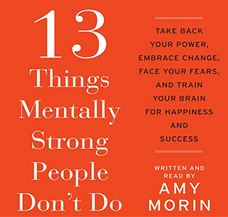It is not uncommon in today’s world for people to speak their mind more and advocate for their virtues. While in the grand scheme, these are all great attributes, these words and actions often cannot break through communication barriers and at times are delivered unclear and offensive. It is easily said, “Don’t take anything personally”, but how do you actually apply that principle? Our perspective is our point of view and it is responsible for shaping our decisions and controlling our actions. So let’s take a minute to dig a little deeper and find out what influences our perspective.
To begin, we must access our mental strength. The book “13 Things Mentally Strong People Don’t Do” is a great resource to read for learning more about how to develop mental strength and to not take things personally. Because of the power perspective has to directly impact our decisions and morals. Becoming aware of our personal perspective is the first step to living a care-free life where you can live by the rule, “Don’t take anything personally”. In the words of the famous Dalai Lama, “The purpose of our lives is to be happy”. Through empowerment, inspiration, and helping others, you can find the answers to this happiness.
First, you must consider your mental health and it’s role in the principle of happiness. Mental health and empowerment correlate to the level of influence and control that you exercise over events in your life. Mental health conditions such as anxiety, depression, and eating disorders are some of the biggest struggles of our society.
5 Steps to Identify and Treat Anxiety Triggers
Overcoming anxiety is always easier said than done. In one moment you think you are on the right track and next thing you know you are back to square one. By taking the correct approach, step-by-step, you can ease your anxiety symptoms and begin to gain control in these anxious times. The most important lesson to learn is that you are not alone in this struggle, and there is help. When you increase your awareness you can identify the triggers that cause increasingly anxious episodes. With these five steps you can learn to identify and treat anxiety triggers.
- The fear of a poor health diagnosis is a prominent cause of anxiety triggers. Becoming engaged with your doctor can help alleviate anxiety caused for this reason.
- Medications, whether prescription or over-the-counter, also cause anxiety. It is important to know the side effects of all medicine that you take.
- Caffeine intensifies the effects of anxiety. Avoiding caffeine can help improve the response to anxiety triggers.
- Social events in a room full of strangers can be daunting to anxiety sufferers. Bringing a friend along would be a helpful avoidance tactic for these triggers.
- Stress is usually hard to avoid. Taking the time to learn some coping mechanisms can help to greatly alleviate tension for anxiety sufferers.
5 Key Skills to Cope With Depression
An estimated 3.8% of the population suffers from depression. There are 5 key coping skills that are paramount to dealing with this mental health disorder.
- First, seek meaning. Finding small things you can do to help others will in turn give you a sense of self worth and help avoid a depressive state.
- Find workable goals and work to obtain those goals. This will give you a sense of accomplishment and fulfillment.
- Schedule healthy hobbies and activities to engage in. This will give you something to look forward to and be held accountable to. If you are worried you will not be able to follow through then appoint an accountability partner to make sure you are participating. When they push you, don’t take anything personally, make yourself listen to their advice and remember they are looking out for you.
- Stay engaged in the present moment. When your mind starts to wander with self-judgement, allow your thoughts to be redirected to a time when you felt accomplished. This mindfulness will dilute the negative thoughts and help you to keep pushing forward in a positive light.
- Exercise and eat right. You will feel better about yourself when you know you are taking care of yourself.
Three Ways to Overcome Eating Disorders
Eating disorders affect up to 5% of the population. Individuals that have distressed thoughts and emotions some times turn this into food-related battles or eating disorders. To overcome eating disorders, there are three main initial steps.
- Find someone you trust to confide in. Once someone else is aware they can be your advocate and help you take a stand to overcome your battle.
- Seeking professional help will give you the best chance at a full recovery for your eating disorder.
- Research treatment plans to determine what you are most comfortable with. There are many methods of treatment and gaining a thorough understanding of your options will give you a better chance for success and overall recovery.
In battling any mental disorder, self-awareness is very important to ensure you can track your progress and be in tune with the changes being made. The well-respected icon Oprah Winfrey simply states, “Turn your wounds into wisdom. Where there is no struggle, there is no strength.” Through your journey in healing, people will have opinions that you may not like, but don’t take anything personally. Remember that you are in control of your destiny and recovery.
Through your own self-recovery, you will inspire others to find their own mental and emotional freedom. Prepare yourself with the knowledge and resources, and don’t be scared to ask for help when needed. If you are ready to begin the process of your healing journey. The book, “13 Things Mentally Strong People Don’t Do” can help you to take back your power and train your brain for happiness and success. Equip yourself with the tools and improve the quality of your life. It is in our darkest moments that we must focus to see the light” – Aristotle.





